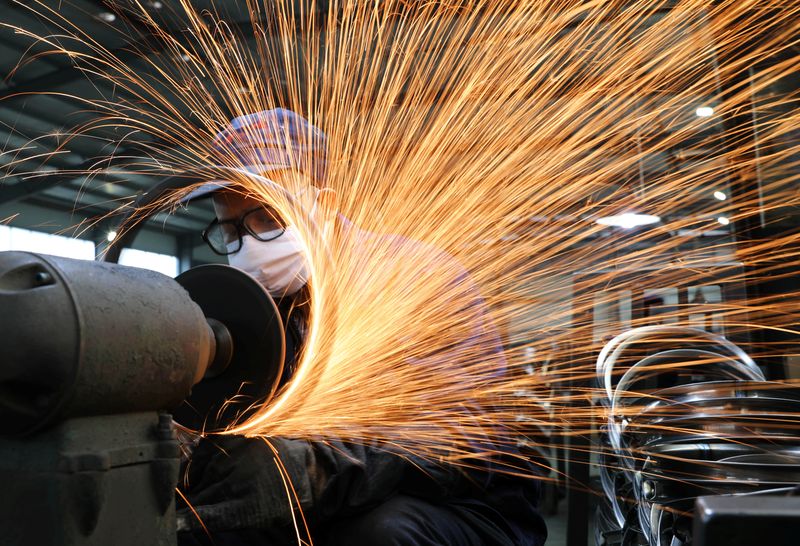By Ellen Zhang and Ryan Woo
BEIJING (Reuters) -China's manufacturing activity unexpectedly shrank in April, official data showed on Sunday, raising pressure on policymakers seeking to boost an economy struggling for a post-COVID lift-off amid subdued global demand and persistent property weakness.
The official manufacturing purchasing managers' index (PMI) declined to 49.2 from 51.9 in March, according to data from the National Bureau of Statistics, below the 50-point mark that separates expansion and contraction in activity on a monthly basis.
That missed expectations of 51.4 tipped by economists in a Reuters poll and marked the first contraction since December, when the official manufacturing PMI was at 47.0.
The world's second-biggest economy grew faster than expected in the first quarter thanks to robust services consumption, but factory output has lagged amid weak global growth. Slowing prices and surging bank savings are raising doubts about demand.
The Politburo, a top decision-making body of the ruling Communist Party, on Friday stressed that restoring and expanding demand is the key to a durable recovery and cautioned the current improvement is mainly restorative "with weak momentum and insufficient demand".
"A lack of market demand and the high-base effect from the quick manufacturing recovery in the first quarter" were among factors that led to the contraction in April, said senior NBS statistician Zhao Qinghe.
New export orders edged down to 47.6 from 50.4 in March, the PMI showed.
The manufacturing sector, which employs about 18% of China's workforce, remains under pressure due to slack global demand. Some exporters told Reuters at the country's biggest trade fair they have frozen investments and some have cut labour costs in response.
To boost trade and employment, the cabinet last week unveiled plans, including supporting auto exports, facilitating visas for overseas businesspeople and providing subsidies to firms that hire college graduates.
Confidence in the property sector, for years a pillar of China's growth, remains fragile. Multiple crises since mid-2020 have included developers' debt defaults and stalled construction of pre-sold housing projects.
While policy support measures have helped improve conditions in the industry, pockets of weakness remain and a full recovery appears some way off.
Despite the recent strength in consumption, the non-manufacturing PMI edged down to 56.4 versus 58.2 in March.
Data this month showed retail sales growth quickening in March to near two-year highs, but that was off a low base and economists are cautious on the sustainability of such strength.

The composite PMI, which includes manufacturing and non-manufacturing activity, dropped to 54.4 from 57.0.
The PMI readings, along with other mixed economic signals, including robust holiday travel and muted property market activities, "will likely keep the pressure on the government to continue its supportive fiscal and monetary policies in Q2", said Zhiwei Zhang, chief economist at Pinpoint Asset Management.